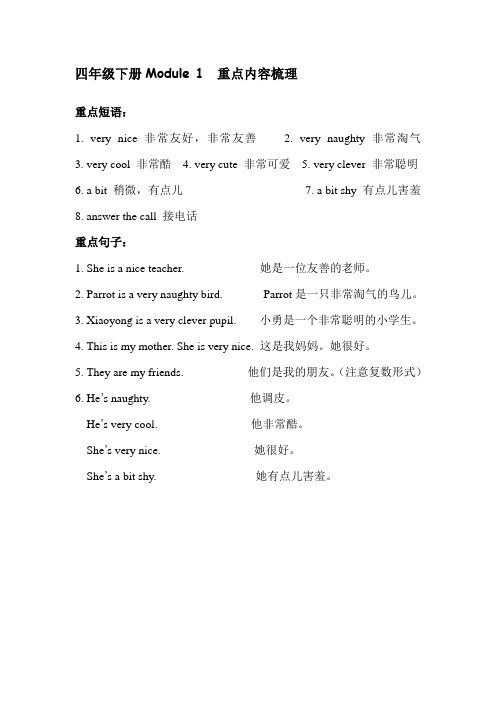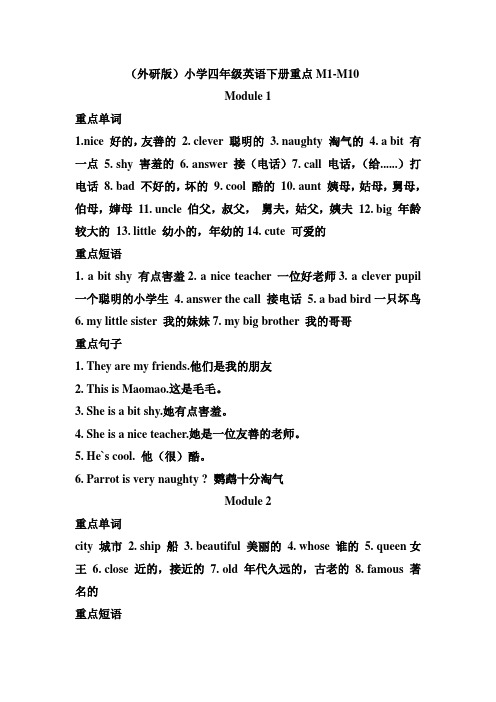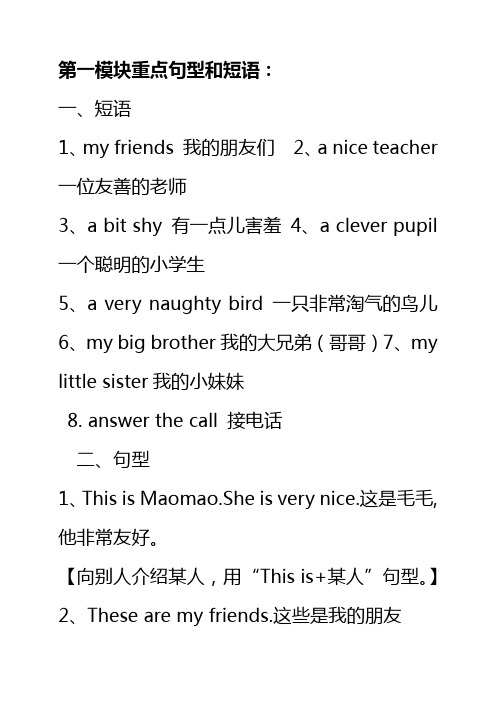外研社小学四年级下英语复习提纲M5-M10
小学四年级下英语复习资料M1-M10

重点短语:1. very nice 非常友好,非常友善2. very naughty 非常淘气3. very cool 非常酷4. very cute 非常可爱5. very clever 非常聪明6. a bit 稍微,有点儿7. a bit shy 有点儿害羞8. answer the call 接电话重点句子:1. She is a nice teacher. 她是一位友善的老师。
2. Parrot is a very naughty bird. Parrot是一只非常淘气的鸟儿。
3. Xiaoyong is a very clever pupil. 小勇是一个非常聪明的小学生。
4. This is my mother. She is very nice. 这是我妈妈。
她很好。
5. They are my friends. 他们是我的朋友。
(注意复数形式)6. He’s naughty. 他调皮。
He’s very cool. 他非常酷。
She’s very nice. 她很好。
She’s a bit shy. 她有点儿害羞。
重点单词及短语:1. Buckingham Palace 白金汉宫2. Big Ben 大本钟3. Hyde Park 海德公园4. Tower Bridge 塔桥5. a big city 一个大城市6. a small village一个小村庄7. very big and beautiful 很大很漂亮8. very famous and beautiful 很有名很漂亮9. about London 关于伦敦10. be close to 接近,靠近......11. whose house 谁的房子12. the Queen’s house 女王的房子重点句子:1. London is a big city. 伦敦是个大城市。
2. This is a book about London. 这是一本关于伦敦的书。
外研版(新)小学四年级下册重点M1——M10!

(外研版)小学四年级英语下册重点M1-M10Module 1重点单词1.nice 好的,友善的2. clever 聪明的3. naughty 淘气的4. a bit 有一点5. shy 害羞的6. answer 接(电话)7. call 电话,(给......)打电话8. bad 不好的,坏的9. cool 酷的10. aunt 姨母,姑母,舅母,伯母,婶母11. uncle 伯父,叔父,舅夫,姑父,姨夫12. big 年龄较大的13. little 幼小的,年幼的14. cute 可爱的重点短语1. a bit shy 有点害羞2. a nice teacher 一位好老师3. a clever pupil 一个聪明的小学生4. answer the call 接电话5. a bad bird一只坏鸟6. my little sister 我的妹妹7. my big brother 我的哥哥重点句子1. They are my friends.他们是我的朋友2. This is Maomao.这是毛毛。
3. She is a bit shy.她有点害羞。
4. She is a nice teacher.她是一位友善的老师。
5. He`s cool. 他(很)酷。
6. Parrot is very naughty ? 鹦鹉十分淘气Module 2重点单词city 城市2. ship 船3. beautiful 美丽的4. whose 谁的5. queen女王 6. close 近的,接近的7. old 年代久远的,古老的8. famous 著名的重点短语1. a book about London 一本关于伦敦的书2. a big city 一个大城市3. 白金汉宫Buckingham Palace4. 女王的房子the Queen`s house5. 泰晤士河the River Thames6. 塔桥Tower Bridge7.海德公园Hyde Park8. 大本钟Big Ben9. 倒下fall down重点句子1. What`s this ? 这是什么?2. It`s a book about London . 这是一本关于伦敦的书3. It`s very big and very beautiful .它非常大非常美丽。
外研版英语四年级下册Module 10 模块知识必备清单

模块知识必备清单重点词汇found(find的过去式)发现,找到then 然后water 水cold 感冒bought(buy 的过去式)买hospital 医院had(have 的过去式)吃;喝fall 掉下,落下;摔倒fell(fall 的过去式)掉下,落下;摔倒town 城镇,市镇happen 发生ride 骑车fever 发烧thirsty(口)渴的watermelon 西瓜stomach ache 胃痛h eadache 头痛bump 撞伤chocolate 巧克力carried(carry 的过去式)拿,搬重点短语fall off 跌落fall down 摔倒,跌倒;坍塌buy some water 买一些水have a cold 感冒bump my head 撞伤我的头have got a stomach ache 胃痛all the day一整天have got a fever 发烧on the bike 在自行车上have a headache 头痛重点句型1 What happened to your head, Daming? 你的头怎么了,大明?解读:此句是由what 引导的特殊疑问句,用于询问某人或某人的身体部位发生了什么情况。
其中what 是疑问词,意为“什么”,to 在此处是介词,后接名词(词组)或人称代词的宾格。
句型结构:What happened to + 某人/ 身体部位(+ 其他)?拓展:询问“……怎么了?”的其他句型为“What’s wrong(with...)?”或“What’s the matter/ trouble(with...)?”。
2 Today he’s got a stomach ache. 今天他胃疼。
解读:此句是陈述句,he’s 是he has 的缩写形式,句型结构为“(时间+)主语+ have/has got a/an + 疾病名称. ”。
外研版(三年级起点)版小学四年级下册英语知识点讲解归纳

外研版(三年级起点)版小学四年级下册英语知识点讲解归纳本文档旨在归纳和讲解外研版(三年级起点)版小学四年级下册的英语知识点。
以下是该教材的主要内容和重点。
请注意,本文档不会对具体细节进行摘要和总结,而是提供简要的概述。
一、Unit 1: My School- 词汇: 学校设施、研究用品、科目名称- 句型: What's in the...? It's a/an...- 语法: 形容词的基本用法二、Unit 2: My Family- 词汇: 家庭成员、家居物品、情感词汇- 句型: Whose...is this/that? It's...三、Unit 3: My Friends- 词汇: 描述外貌特征、性格特点、兴趣爱好- 句型: What does he/she look like? He/She is...四、Unit 4: My Day- 词汇: 时间词、日常活动、地点名称- 句型: What do you do...? I...- 语法: 简单现在时的用法五、Unit 5: My Home- 词汇: 家庭活动、房间名称、家具物品- 句型: Do you like...? Yes, I do/No, I don't.六、Unit 6: My Town- 词汇: 地点名称、城市景点、交通工具- 句型: How do you go to...? I go by...- 语法: 方位介词的基本用法七、Unit 7: Nature- 词汇: 自然界事物、季节、天气- 句型: What's the weather like...? It's...- 语法: 一般疑问句的基本用法八、Unit 8: Fun Time- 词汇: 运动项目、游戏名称、娱乐活动- 句型: Can you...? Yes, I can/No, I can't.以上是外研版(三年级起点)版小学四年级下册的英语知识点讲解的简要归纳。
外研英语四年级下M5

They are old. They weren't old then. They were young.
• • • • • • • •
They were/weren't old then. They are/aren't young now. It was/wasn't thin then. It is/isn't fat now. He was/wasn't short then. He is/isn't tall now. It was/wasn't clean then. It is/isn't dirty now.
• • • •
This is me. I was one. I was short. Now I'm tall.
• • • • • • •
Who is that little girl? It's me! I was two then. Your hair was so short. Yes, now my hair is long. You were so cute! Yes, but I was very naughty too.
1. She wasn't tall now. She was short. ( ) A B C 2. They aren't old then. They were young. ( ) A B C 3. --Which are they?--They are my parents. ( ) A B C 4. She was fat then. Now she is thinner. ( ) A B C
• She is tall. • She wasn't tall then. • She was short.
外研版小学四年级英语下册期中考试复习提纲

第一模块重点句型和短语:一、短语1、my friends 我的朋友们2、a nice teacher 一位友善的老师3、a bit shy 有一点儿害羞4、a clever pupil 一个聪明的小学生5、a very naughty bird 一只非常淘气的鸟儿6、my big brother我的大兄弟(哥哥)7、my little sister我的小妹妹8. answer the call 接电话二、句型1、This is Maomao.She is very nice.这是毛毛,他非常友好。
【向别人介绍某人,用“This is+某人”句型。
】2、These are my friends.这些是我的朋友3、She is a bit shy.她有点害羞。
4、She is a nice teacher.她是一位友善的老师。
5、He`s a clever pupil ,he is very naughty. 他是一个小学生,他(很)淘气。
6、This is my big brother,he is cool. 这是我的大哥哥,他是酷的。
7. This is my little sister ,she is cute.这是我的小妹妹,她是可爱的。
8.Can you answer the call ?你能接电话吗?第二模块重点句型和短语:一、短语1、一本关于伦敦的书 a book about London2、来自…(是…人)be from…3、白金汉宫the Buckingham Palace4、女王的房子the Queen`s house5、大本钟the Big Ben6、海德公园the Hyde Park7、塔桥the Tower Bridge 8. a big city 一个大城市9.very famous 非常著名10. Close to 靠近.....二、句型1、What`s this ? 这是什么?【其答句要用“It`s”开头的句子。
外研社小学英语一年级起点四年级下知识点整理
英语(四年级下)主要知识点整理(例句都是课本中原句)1.祈使句:表示请求、命令、建议等的句子。
祈使句不需要主语,谓语动词用原形,句子末尾一般用感叹号。
eg: (1) Don’t walk on the grass! (否定祈使句)(2)Let’s make a newspaper! (肯定祈使句)2.一般现在时:经常发生的动作或状态(常与always, usually, often, sometimes, seldom, never, every day/week/year, on Sundays ...连用)(1) be动词的一般现在时:(比较简单)I am, We/You/They are, He/She/It is,There is+单数名词或不可数名词, There are + 复数名词eg: It’s not beautiful, but it’s helpful.(2) 行为动词的一般现在时:(单数第三人称的变化是重点、易错点; 助动词用do, don’t, does, doesn’t)eg: (1)This machine cuts the potatoes.(2) Does he live in New York(3) Fish live in the river and birds live in the tree. (***注意fish单数和复数写法一样,这里fish前面没有a, 所以是复数形式,后面接谓语动词要用原形。
另外,Sheep和deer单复数也是一样的形式)3.一般过去时:表示过去发生的动作或状态(常与...ago, yesterday, the day before yesterday, last week/year/month, once upon a time, one day, the next day, in 2016...连用)(1)be动词的一般过去时:I/He/She/It was, We/You/They were, There was+单数名词或不可数名词, There were + 复数名词eg:Once upon a time, there was a boy. (讲故事常用说法)(2)行为动词的一般过去时:(助动词用did, didn’t)①一般动词变化:构成法:1. 动词原形+ed. 如:look--looked2.以e结尾的词+d. 如:live--lived3.以辅音字母+y结尾的词,改y为i, 再加ed.如:study--studied, cry--cried.4.以重读闭音节或r音节结尾,末尾只有一个辅音字母的词,双写这个辅音字母,再加ed. 如: clap--clapped, stop--stopped,prefer--preferred②不规则动词变化:如had, said, put, saw, got, ran, learnt(英式写法), bought, came, took, went等eg1: The animals had a concert last week.eg2: The next day, the boy ran to the village again.eg3: What did he play yesterdayeg4: When did you get up last Sunday I got up at 8 o’clock.4.一般将来时:表示还没有发生但将要发生的事情或动作(常与tomorrow, the day after tomorrow, next year/month/week, soon, in the future, in ... minutes/hours/days...连用)(1)Be going to+ 动词原形:多表示即将发生,最近打算、计划、安排好要做的事情,主观性较强(区分人称,be动词变化am, is, are)eg: She’s going to visit Australia.(2)Will+动词原形:多表示即将发生的动作或状态,不受主观因素影响的单纯的将来,客观性较强(不区分人称,都用will)(***目前小学阶段对这两种形式区分并不明显,可以互换使用)eg: We will go to the zoo on Sunday.5.现在进行时:表示正在进行或发生的动作(常与now, at present, at this moment连用)Be动词+动词的现在分词(***区分人称,注意动词的现在分词构成的特殊情况)动词的现在分词构成法:(1)一般规则:动词+ing, 如: work--working.(2) 以e结尾的动词去掉e加ing. 如: live--living, have--having.(3) 以重读闭音节或r音节结尾,末尾只有一个辅音字母的词,双写这个辅音字母,再加ing. 如: swim--swimming, clap--clapping, refer--referring.(4) 以ie结尾的重读开音节的词,改ie为y, 再加ing. 如: die--dying. eg: (1) What’s happening now(2) Daming is making a card for his father.(3)We are having a party.6.购物相关话题:(1)I want to buy a pen.(2)It’s expensive/cheap.(3)It costs one hundred and eighteen yuan.(4)Who wants to buy it7.音乐演奏相关话题:(***演奏乐器前要加定冠词the )(1)I played the piano yesterday.(2)You’re playing the violin for your father.(3)My mum and dad played in the concert.(4)In the end, everyone clapped.(***注意玩球类运动不能加定冠词the, eg:I played football yesterday. ) 8.时间相关话题:(1)What’s the time now(2)What time is it now(3)It’s 2o’clock.(4)Is it breakfast/lunch/dinner time now(5)The Chinese cartoon Shaolin Kids is on TV at 8 o’clock.9.方向相关话题:(1)Where is the library(2)It’s in the north/south/west/east of China.(3)I went to the north/south/west/east.(4)Beijing is the capital of China.10.原因相关话题:(1)Why do fish live in the river(2)Because cats can’t live in the water.(3)。
最新外研版小学四年级英语下册期末复习资料(全册)
最新外研版小学四年级英语下册期末复习资料(全册)小学四年级英语下册第一模块重点句型和短语:短语:1.My friends - 我的朋友们2.A bit - 一点儿3.A nice teacher - 一位友善的老师4.A clever pupil - 一个聪明的小学生5.A very naughty bird - 一只非常淘气的鸟儿6.My big brother - 我的大兄弟(哥哥)7.My little sister - 我的小妹妹句型:2.This is Maomao。
- 这是毛毛。
3.She is a bit shy。
- 她有点害羞。
4.She is a nice teacher。
- 她是一位友善的老师。
5.He's cool。
- 他(很)酷。
小学四年级英语下册第二模块重点句型和短语:短语:1.A book about London - 一本关于伦敦的书2.Close to - 接近3.A big city - 一个大城市4.Buckingham Palace - 白金汉宫5.The Queen's house - 皇后(女王)的房子6.Big Ben - 大本钟9.Hyde Park - 海德公园10.Tower Bridge - 塔桥11.London Bridge - 伦敦桥句型:1.What's this。
- 这是什么?2.It's a book about London。
- 它是一本关于伦敦的书。
5.It's very big and very beautiful。
- 它非常大非常美丽。
10.It's very famous。
- 它非常著名。
小学四年级英语下册第三模块重点句型和短语:短语:1.Be (am/is/are) going to + 动词原形 - 表示“打算、准备、将要做某事”2.On Saturday - 在星期六3.Have a ic - 举行、进行野餐4.Will + 动词原形 - 表示将要做某事5.Take your kite - 带上你的风筝(take one's sth.带上某人的东西)6.Go swimming - 去游泳7.Next week - 下周8.A holiday - 一个假期9.Play with my friends - 和我的朋友玩。
外研版四年级英语下册各单元知识点汇总
外研版四年级英语下册各单元知识点汇总Module 1必备知识清单重点词汇nice 友好的,亲切的,讨人喜欢的clever 聪明的answer 接(电话)call 电话;(给……)打电话bad 不好的,坏的cool 酷的aunt 姨母;姑母;舅母;伯母;婶母big 年龄较大的cute 可爱的uncle 伯父;叔父;舅父;姑父;姨父little 幼小的,年幼的naughty 淘气的shy 害羞的重点短语a bit 稍微,有点儿my big brother 我的哥哥my little sister 我的妹妹 a nice teacher 一位好老师a clever pupil 一名聪明的小学生 a bad bird 一只坏鸟tall and clever 又高又聪明answer the call 接电话重点句型1 This is Maomao.这是毛毛。
解读:这是介绍某人或某物的常用句型,this 是指示代词,意为“这,这个”。
This is 不能缩写成This’s。
打电话时也常用“This is... ”来介绍自己。
句型结构:This is + 名字/ 称呼/ 身份.注意:当被介绍的人或物离说话人较远时,用“That is... ”来介绍。
2 (1)She’s very nice. 她非常友好。
(2)He’s a clever pupil.他是一名聪明的小学生。
解读:此组句型用来描述人物的特征或身份,在表示人物特征的形容词前,还可以加表示程度的词汇,如very(很,非常)、a bit(稍微,有点儿)。
在第二个句子中,若形容词的发音以元音音素开头,不定冠词用an;若以辅音音素开头,则用a。
句型结构:(1)She/ He is + 形容词.(2)She/ He is a/ an + 形容词+ 职业/ 身份.重点词汇city 城市ship 船beautiful 美丽的whose 谁的close 近的,接近的old 年代久的,古老的queen 女王famous 著名的重点短语Buckingham Palace 白金汉宫Big Ben 大本钟Hyde Park 海德公园Tower Bridge 塔桥London Bridge 伦敦大桥fall down 跌倒,倒塌a big city 一座大城市重点句型1 (1)London is a big city.伦敦是一座大城市。
四年级英语复习提纲
四年级英语复习提纲目录•Introduction•Unit 1: Greetings•Unit 2: Family•Unit 3: School•Unit 4: Hobbies•ConclusionIntroduction这份英语复习提纲适用于四年级学生,旨在帮助他们复习和巩固在学校里学到的英语知识。
提纲按照课本的单元划分,包括问候、家庭、学校和爱好等主题。
请注意,这份提纲只是一个指导,建议您根据您的实际情况和学生的需求进行相应的调整和补充。
Unit 1: Greetings本单元主要介绍日常问候和自我介绍的常用表达方式。
1. 问候和回答问候•Good morning!(早上好!)•Good afternoon!(下午好!)•Good evening!(晚上好!)•How are you?(你好吗?)•I’m fine, thank you.(我很好,谢谢。
)•Nice to meet you.(很高兴见到你。
)2. 自我介绍•My name is [name].(我的名字是[name]。
)•I am [age] years old.(我[age]岁。
)•I study at [school name].(我在[school name]学习。
)•My hobbies are [hobbies].(我喜欢[hobbies]。
)Unit 2: Family本单元主要介绍家庭成员和家庭关系的表达。
1. 家庭成员•father(爸爸)•mother(妈妈)•brother(哥哥)•sister(姐姐)•grandparents(祖父母)•uncle(叔叔)•aunt(阿姨)2. 家庭关系•This is my [family member].(这是我的[family member]。
)•He/She is my [family member].(他/她是我的[family member]。
)Unit 3: School本单元主要介绍学校生活和常用学习用语。
- 1、下载文档前请自行甄别文档内容的完整性,平台不提供额外的编辑、内容补充、找答案等附加服务。
- 2、"仅部分预览"的文档,不可在线预览部分如存在完整性等问题,可反馈申请退款(可完整预览的文档不适用该条件!)。
- 3、如文档侵犯您的权益,请联系客服反馈,我们会尽快为您处理(人工客服工作时间:9:00-18:30)。
Module 5
一、短语:
1、that little girl那个小女孩
2、so short如此矮/ 短
3、so cute如此可爱
4、very naughty非常淘气
5、my grandparents 我的祖父母/ 外祖父母
二、句型:
1、Who are they, Lingling? 玲玲。
他们是谁?
They are my grandparents. 他们是我的祖父母。
(Who是对人进行提问,也就是对第二句的中的my grandparents的提问。
)
2、They were young then.他们那时很年轻。
(were 是are的过去式)
They are old now. 现在他们老了。
3、I was two, then. 我那时两岁了。
(句中的was是am的过去式)
4、Your hair was so short.(那时)你的头发是如此的短。
(句中的was是is的过去式)
5、Now my hair is long. 现在我的头发很长。
6、They weren’t old then .They were young.那时他们并不老,他们年轻。
7、But it wasn’t beautiful then. 但是那时它并不漂亮。
本课的反义词:now 现在----then 那时short 短的---long 长的short 矮的---tall 高的old 年老的---young 年轻的clean 干净的---dirty肮脏的
本课的时态:一般过去时,描述过去的事情,多与then 搭配使用。
Module 6
一、短语:
1、at home 在家
2、be out 不在家,在外面
3、play in the sun 在太阳下玩耍
4、a big city 一个大城市
5、a small village一个小乡村
二、句型:
1、How are you? 你好吗?Very well, thank you. 非常好,谢谢你。
2、Is it sunny in London? 伦敦天气晴朗吗? No, it isn’t. 不,它不是
3、Was it sunny in London yesterday? 伦敦昨天天气晴朗吗? Yes, it was. 是的,它是
4、I want to play in the sun. 我想在太阳下玩耍。
5、Were you at home yesterday? 你昨天在家吗?No, I wasn’t.不,我不在家。
6.、Are you at home now? 你现在在家吗?Yes, I am. 是的,我在。
7、Was it a big city then? 它那时是个大城市吗? No, it wasn’t. 不,它不是。
8、Was he strong then? 他那时强壮吗?Yes, he was. 是的,他是。
9、Where is he? 他在哪里?(where“哪里”对地点提问)
He’s in Shenzhen. 他在深圳。
Module 7
一、短语:
1、cook noodles 做面条
2、help Mum 帮助妈妈
3、wash clothes 洗衣服
4、a good girl 一个好女孩
5、walk with 与……散步
6、talk with 与……说话
7、phone Grandma 打电话给祖母
8、listen to music听音乐
9、watch TV看电视
10、play on the computer玩电脑
二、句型:
1、本课接着学习过去时态,本课出现的动词与它的过去式有:
cook---cooked 煮help---helped 帮助wash---washed 洗
play---played 玩watch---watched 看talk---talked 谈话
walk---walked 步行phone---phoned 打电话listen---listened 听
2、I cook ed noodles yesterday. 昨天我做了面条。
(“yesterday”昨天,用过去时态)
3、Yes, I help ed Mum and I wash ed clothes. 是的,我帮助了妈妈,也洗了衣服。
4、What about Sam? 萨姆怎么样了呢?
He didn’t help Mum. 他没有帮助妈妈。
5、I talk ed with Mrs Cat yesterday. 昨天我和Cat夫人聊天了。
注:“yesterday”昨天,是过去时态的标志之一。
即出现yesterday,就用过去时态。
Module 8
一、短语:
1、play games 做游戏
2、sing songs唱歌
3、have a picnic 野餐
4、last Sunday上周日
5、by bus坐公交车
6、sing beautifully唱得很动听
7、drink some drinks喝一些饮料8、have a good time玩得开心
9、take some pictures拍了一些照片10、lots of 许多
11、delicious food美味的食物12、some children一些孩子
13、go swimming去游泳14、do my homework做我的家庭作业
二、句型:
1、We saw some children. They played games.我们看见了一些孩子,他们做了游戏。
2、We had a picnic last Sunday. 上周日我们去野餐了。
3、We went there by bus. 我们坐公交车去的那儿。
4、We ate some food and drank some drinks. 我们吃了一些东西,喝了一些饮料。
5、You had a busy day.你们过了忙碌的一天。
6、He was thin then. 他那时很瘦。
He is very fat now. 他现在很胖。
7、Tell me about your picnic. 告诉我关于你野餐的情况。
本课仍然学习过去时态,本课出现的动词与它的过去式有:
see---saw 看见sing---sang 唱have---had吃,举行go---went 去
eat---ate 吃drink---drank 喝take---took 拍摄do---did做
(本课出现的表示过去的时间“last Sunday 上周日”,用于过去时态,)
Module 9
1、live in New York 居住在纽约
2、by train 乘火车
3、by plane乘飞机
4、last year 去年
5、on holiday 在度假
6、last week 上周
7、go to the earth 去地球
8、look at看
9、the West Lake西湖10、have a nice holiday 假期过得愉快11、go to a concert 去听音乐会12、a postcard from…一张来自……的明信片13、play basketball 打篮球
14、these photos 这些照片
句子:1、Welcome to China / Beijing. 欢迎来中国/ 北京。
2、Did he live in New York last year? 他去年居住在纽约吗?No, he did n’t. 不,他没有。
3、Did he travel by plane? 他是乘飞机旅行吗?Yes, he did. 是的,他是。
4、Does he live in New York?他居住在纽约吗?No, he does n’t. 不,他没有
4、I’m on holiday in New York. 我在纽约度假。
5、Did you have a nice holiday?你们假期过得愉快吗?Yes, we did 是的,我们是
Module 10
1、fall off 跌落
2、fall down 摔倒,跌倒
3、go for a bike ride去骑自行车
4、buy some water买一些水
5、take…to the hospital 带…去医院
6、have a cold感冒
7、What happened to your head? 你的头怎么了?8、buy---bought 买
9、Did you fall off your bike? 你从自行车上跌了下来吗?
10、Sam had lots of chocolate. 萨姆吃了许多巧克力。
